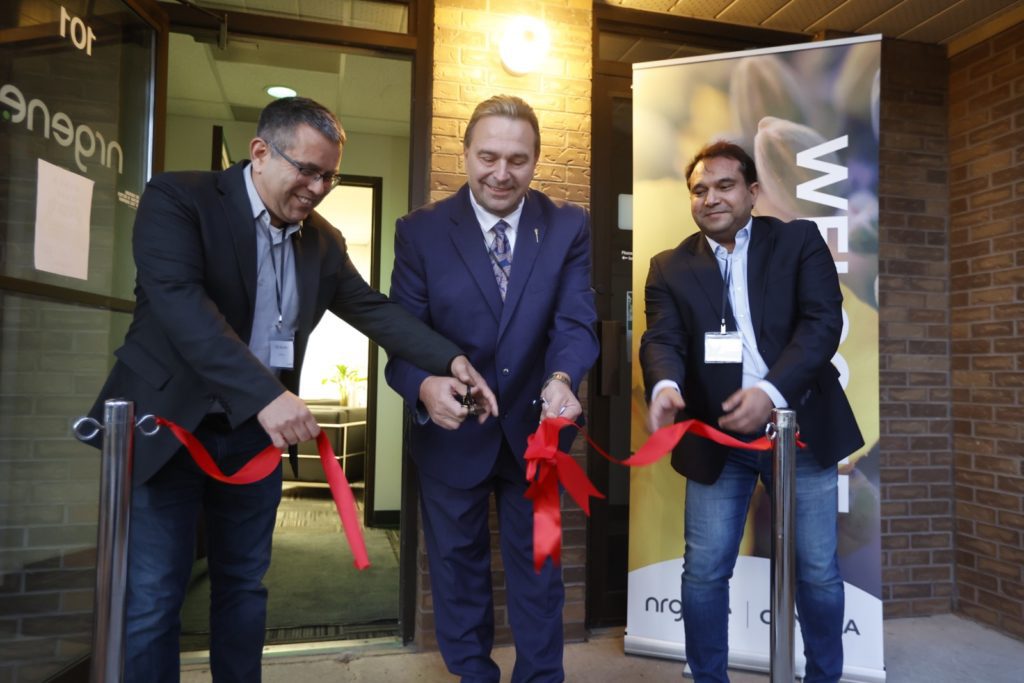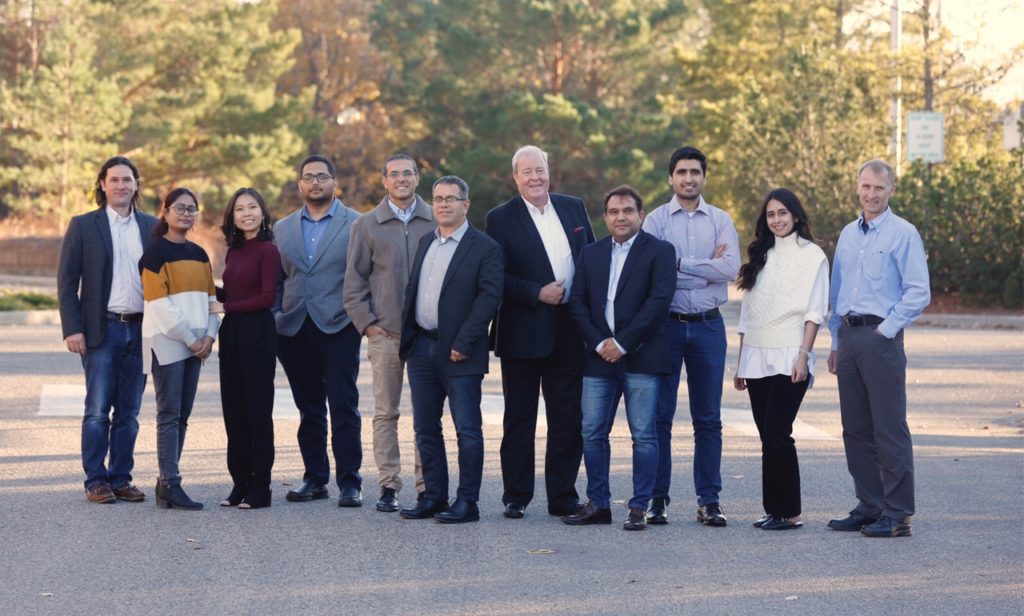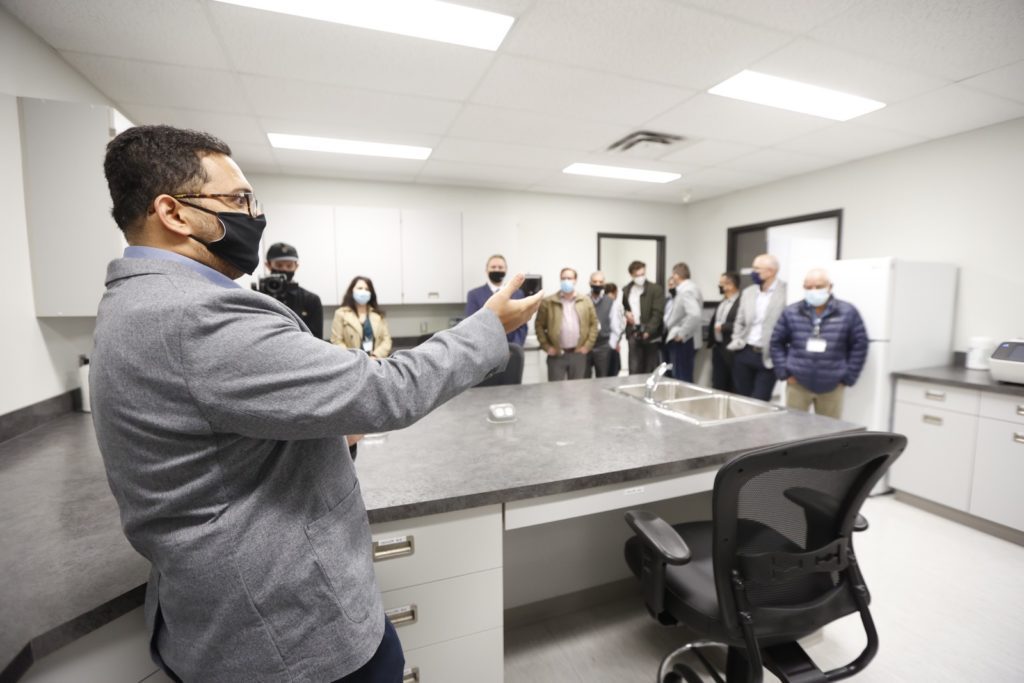NRGene’s technology is making it possible for researchers to speed up their breeding programs like never before.
Curtis Pozniak faced one of the biggest challenges of his career in 2015 when he worked on decoding the wheat genome as part of the International Wheat Genome Sequencing Consortium (IWGSC).
The technology at hand made the consortium’s job a challenge. The wheat genome is five times larger than the human genome. Creating such a massive amount of data was going to require more firepower than was common at the time.
“We were using a very different approach where individual countries within the consortium would sequence an individual chromosome and then, collectively, complete the whole sequence,” says Pozniak, director of the Crop Development Centre at the University of Saskatchewan (USask), which has released over 500 commercial crop varieties over the last 50 years.
It was hard work.
“Around that time, we started to hear rumblings within the international community of this Israeli company called NRGene, and how they’d been working to assemble genomes of various species to a very high quality and very quickly in around a three-to-six-week period.”
It gave Pozniak hope that the team might accomplish its goal much faster than anticipated. After paying a visit to the company’s office in Israel, they soon learned its technology held great promise for helping decode the gargantuan genome of wheat.
“The advantage of having genome sequences like this is that you’re able to have a blueprint of all the genes in the genome and their order relative to one another, which really makes it a lot easier to identify and develop useful DNA markers that you can use in a selection program,” Pozniak adds.
Variety development across the world then took a major leap forward in early 2016 when, at the annual Plant and Animal Genome Conference, the team pulled back the curtain to reveal the highly complex genome of bread wheat.
“We were able to get to the finish line a lot faster than we would have otherwise,” Pozniak says.
This collaboration, followed by a wide range of other projects with Canadian partners, led to the opening of NRGene’s new office and genotyping lab in Saskatoon, Sask., at Innovation Place, in the agriculture research cluster, in October, 2021. Now, Canadian customers and researchers can enjoy a complete solution: leverage local support of NRGene’s experts coupled with additional services provided by the genotyping lab.
Need for Speed
Pozniak’s project is a success story that’s become very familiar to the ears of Gil Ronen, founder and chief executive officer of NRGene. The company has assembled over 500 genomes in less than four years using artificial intelligence (AI)-based genomic tools and provides some of the largest ag-based companies in the world with computational tools to optimize and accelerate breeding programs.
Speeding up breeding programs has become Ronen’s life’s work, allowing breeders to do things they’ve never been able to do before.
The key to their success is generating high quality data, he says. That’s where NRGene comes in.
“Historically, plant breeding has been a very long and tedious process in which you try to improve a plant from generation to generation, and you do it with very little data. There’s been so much trial and error involved. But if you can use data, especially genomic data, you can actually target your breeding and make it far more efficient,” Ronen says.
“The whole idea with genomics AI is that you create a map of the whole genome to help identify crucial gene combinations. If you can find them ahead of time using genomics on your computer, then you know what you’re looking for and don’t have to breed generations of plants to get to the required result.”
When they were approached by the IWGSC in 2015, Ronen’s team offered to decode the genome all in one set — meaning the genome is sequenced with many short reads, and this data is then assembled like a large puzzle.
Back then, the idea of decoding a genome that’s five times bigger than the human genome all in one shot was very new.
“Instead of taking 12 years, we assembled the genome in 12 days, and instead of decoding only 5% of it, we’ve reached 98%. At the time it was quite a remarkable feat.”
Researchers like Pozniak need such valuable data to find genes related to disease resistance, stress tolerance, quality and other traits.
“When we give breeders a map of the full genome, they are able to specifically target those favourable genes in their breeding population and make their work more efficient. In Canada it began with wheat, but it’s since moved to many other crops that are bred here in Saskatchewan, including barley and lentils and even canola,” Ronen says.
Opening Doors
Those other crops benefiting from the wonders of genomics AI include medical cannabis and canola. Nuseed — which has developed traits for customers across Australia, Europe, North and South America — first collaborated with NRGene in 2019. Nuseed then joined the International Canola Pan-genome Consortium, meant to advance the canola industry by capturing the crop’s broad genetic diversity. Nuseed contributed its own canola lines to the research and received the full pangenome comparison results.
“As Nuseed started to grow its breeding program in North America, we needed this kind of technology to develop molecular markers to help speed up our targeted selection. That said, I look at this partnership in a much longer-term way,” says Katy Navabi, Nuseed’s North America Canola breeding leader.
“As we introduce more elite germplasm to our breeding, we have to be very familiar with that germplasm at the sequence level.”
The same need for efficiency and clarity is felt in the medical cannabis space. According to Larry Holbrook, chief scientific officer for Zyus based in Saskatoon, a key to success in modern cannabis breeding is to have genomic data to help “clean up” a crop that historically didn’t have a high level of private and public funding to help improve its genetics.
“Without genomics data, you’re just not going to make it in the cannabis sphere in this day and age,” Holbrook says.
He was introduced to genomics AI technology through NRGene in 2015 when cannabis genetics were still in their formative stages.
“Things were quite crude back then. We had terribly scattered, messy genetics in the cannabis world. We didn’t have a reference plant. NRGene’s know-how helped us change all that.”
As a result, Zyus — the first supplier of medical cannabis to Health Canada — is now able to define the kind of cannabinoid profiles that are believed to be beneficial in treating specific medical disorders.
“We really need NRGene’s expertise to help us develop those genomic reference maps, which will help us create products with specific cannabinoid profiles. We couldn’t possibly invest all that money internally to generate that data ourselves. It would be totally cost-prohibitive,” he adds.
New Technology, New Opportunity
NRGene is expanding into new territories to be more accessible and help researchers around the globe innovate and bolster their reputations on the world stage.
Turning technological capability into business success for both the breeder and NRGene itself requires knowing the market and which crops are going to be at the centre of the innovation space in the years ahead, says NRGene’s Chief Strategy Officer Rick Calk.
To keep up to the change, breeders need fast, convenient access to genomic technologies that will help them deliver new varieties faster than ever before. It was that need to stay ahead of the global breeding game that helped NRGene pave its path into the Canadian market.
“Being here on campus in Saskatchewan allows us to have really good relationships with people who are technology leaders to drive our businesses mutually forward,” Calk adds.
The canola, hemp and plant-based protein spaces are key areas NRGene Canada will focus on as it ramps up its Canadian presence, he adds.
https://youtu.be/QlwX4HRZfZ0















